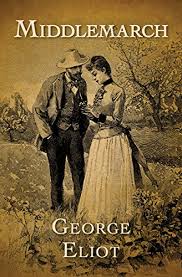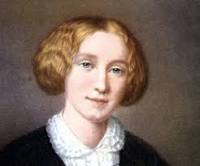Middlemarch Page #7
Middlemarch, A Study of Provincial Life is a novel by the English author George Eliot, appearing in eight instalments in 1871 and 1872. Set in a fictitious Midlands town from 1829 to 1832, it follows distinct, intersecting stories with many characters.
Miss Brooke argued from words and dispositions not less unhesitatingly than other young ladies of her age. Signs are small measurable things, but interpretations are illimitable, and in girls of sweet, ardent nature, every sign is apt to conjure up wonder, hope, belief, vast as a sky, and colored by a diffused thimbleful of matter in the shape of knowledge. They are not always too grossly deceived; for Sinbad himself may have fallen by good-luck on a true description, and wrong reasoning sometimes lands poor mortals in right conclusions: starting a long way off the true point, and proceeding by loops and zigzags, we now and then arrive just where we ought to be. Because Miss Brooke was hasty in her trust, it is not therefore clear that Mr. Casaubon was unworthy of it. He stayed a little longer than he had intended, on a slight pressure of invitation from Mr. Brooke, who offered no bait except his own documents on machine-breaking and rick-burning. Mr. Casaubon was called into the library to look at these in a heap, while his host picked up first one and then the other to read aloud from in a skipping and uncertain way, passing from one unfinished passage to another with a “Yes, now, but here!” and finally pushing them all aside to open the journal of his youthful Continental travels. “Look here—here is all about Greece. Rhamnus, the ruins of Rhamnus—you are a great Grecian, now. I don’t know whether you have given much study to the topography. I spent no end of time in making out these things—Helicon, now. Here, now!—‘We started the next morning for Parnassus, the double-peaked Parnassus.’ All this volume is about Greece, you know,” Mr. Brooke wound up, rubbing his thumb transversely along the edges of the leaves as he held the book forward. Mr. Casaubon made a dignified though somewhat sad audience; bowed in the right place, and avoided looking at anything documentary as far as possible, without showing disregard or impatience; mindful that this desultoriness was associated with the institutions of the country, and that the man who took him on this severe mental scamper was not only an amiable host, but a landholder and custos rotulorum. Was his endurance aided also by the reflection that Mr. Brooke was the uncle of Dorothea? Certainly he seemed more and more bent on making her talk to him, on drawing her out, as Celia remarked to herself; and in looking at her his face was often lit up by a smile like pale wintry sunshine. Before he left the next morning, while taking a pleasant walk with Miss Brooke along the gravelled terrace, he had mentioned to her that he felt the disadvantage of loneliness, the need of that cheerful companionship with which the presence of youth can lighten or vary the serious toils of maturity. And he delivered this statement with as much careful precision as if he had been a diplomatic envoy whose words would be attended with results. Indeed, Mr. Casaubon was not used to expect that he should have to repeat or revise his communications of a practical or personal kind. The inclinations which he had deliberately stated on the 2d of October he would think it enough to refer to by the mention of that date; judging by the standard of his own memory, which was a volume where a vide supra could serve instead of repetitions, and not the ordinary long-used blotting-book which only tells of forgotten writing. But in this case Mr. Casaubon’s confidence was not likely to be falsified, for Dorothea heard and retained what he said with the eager interest of a fresh young nature to which every variety in experience is an epoch. It was three o’clock in the beautiful breezy autumn day when Mr. Casaubon drove off to his Rectory at Lowick, only five miles from Tipton; and Dorothea, who had on her bonnet and shawl, hurried along the shrubbery and across the park that she might wander through the bordering wood with no other visible companionship than that of Monk, the Great St. Bernard dog, who always took care of the young ladies in their walks. There had risen before her the girl’s vision of a possible future for herself to which she looked forward with trembling hope, and she wanted to wander on in that visionary future without interruption. She walked briskly in the brisk air, the color rose in her cheeks, and her straw bonnet (which our contemporaries might look at with conjectural curiosity as at an obsolete form of basket) fell a little backward. She would perhaps be hardly characterized enough if it were omitted that she wore her brown hair flatly braided and coiled behind so as to expose the outline of her head in a daring manner at a time when public feeling required the meagreness of nature to be dissimulated by tall barricades of frizzed curls and bows, never surpassed by any great race except the Feejeean. This was a trait of Miss Brooke’s asceticism. But there was nothing of an ascetic’s expression in her bright full eyes, as she looked before her, not consciously seeing, but absorbing into the intensity of her mood, the solemn glory of the afternoon with its long swathes of light between the far-off rows of limes, whose shadows touched each other. All people, young or old (that is, all people in those ante-reform times), would have thought her an interesting object if they had referred the glow in her eyes and cheeks to the newly awakened ordinary images of young love: the illusions of Chloe about Strephon have been sufficiently consecrated in poetry, as the pathetic loveliness of all spontaneous trust ought to be. Miss Pippin adoring young Pumpkin, and dreaming along endless vistas of unwearying companionship, was a little drama which never tired our fathers and mothers, and had been put into all costumes. Let but Pumpkin have a figure which would sustain the disadvantages of the shortwaisted swallow-tail, and everybody felt it not only natural but necessary to the perfection of womanhood, that a sweet girl should be at once convinced of his virtue, his exceptional ability, and above all, his perfect sincerity. But perhaps no persons then living—certainly none in the neighborhood of Tipton—would have had a sympathetic understanding for the dreams of a girl whose notions about marriage took their color entirely from an exalted enthusiasm about the ends of life, an enthusiasm which was lit chiefly by its own fire, and included neither the niceties of the trousseau, the pattern of plate, nor even the honors and sweet joys of the blooming matron. It had now entered Dorothea’s mind that Mr. Casaubon might wish to make her his wife, and the idea that he would do so touched her with a sort of reverential gratitude. How good of him—nay, it would be almost as if a winged messenger had suddenly stood beside her path and held out his hand towards her! For a long while she had been oppressed by the indefiniteness which hung in her mind, like a thick summer haze, over all her desire to make her life greatly effective. What could she do, what ought she to do?—she, hardly more than a budding woman, but yet with an active conscience and a great mental need, not to be satisfied by a girlish instruction comparable to the nibblings and judgments of a discursive mouse. With some endowment of stupidity and conceit, she might have thought that a Christian young lady of fortune should find her ideal of life in village charities, patronage of the humbler clergy, the perusal of “Female Scripture Characters,” unfolding the private experience of Sara under the Old Dispensation, and Dorcas under the New, and the care of her soul over her embroidery in her own boudoir—with a background of prospective marriage to a man who, if less strict than herself, as being involved in affairs religiously inexplicable, might be prayed for and seasonably exhorted. From such contentment poor Dorothea was shut out. The intensity of her religious disposition, the coercion it exercised over her life, was but one aspect of a nature altogether ardent, theoretic, and intellectually consequent: and with such a nature struggling in the bands of a narrow teaching, hemmed in by a social life which seemed nothing but a labyrinth of petty courses, a walled-in maze of small paths that led no whither, the outcome was sure to strike others as at once exaggeration and inconsistency. The thing which seemed to her best, she wanted to justify by the completest knowledge; and not to live in a pretended admission of rules which were never acted on. Into this soul-hunger as yet all her youthful passion was poured; the union which attracted her was one that would deliver her from her girlish subjection to her own ignorance, and give her the freedom of voluntary submission to a guide who would take her along the grandest path.
Translation
Translate and read this book in other languages:
Select another language:
- - Select -
- 简体中文 (Chinese - Simplified)
- 繁體中文 (Chinese - Traditional)
- Español (Spanish)
- Esperanto (Esperanto)
- 日本語 (Japanese)
- Português (Portuguese)
- Deutsch (German)
- العربية (Arabic)
- Français (French)
- Русский (Russian)
- ಕನ್ನಡ (Kannada)
- 한국어 (Korean)
- עברית (Hebrew)
- Gaeilge (Irish)
- Українська (Ukrainian)
- اردو (Urdu)
- Magyar (Hungarian)
- मानक हिन्दी (Hindi)
- Indonesia (Indonesian)
- Italiano (Italian)
- தமிழ் (Tamil)
- Türkçe (Turkish)
- తెలుగు (Telugu)
- ภาษาไทย (Thai)
- Tiếng Việt (Vietnamese)
- Čeština (Czech)
- Polski (Polish)
- Bahasa Indonesia (Indonesian)
- Românește (Romanian)
- Nederlands (Dutch)
- Ελληνικά (Greek)
- Latinum (Latin)
- Svenska (Swedish)
- Dansk (Danish)
- Suomi (Finnish)
- فارسی (Persian)
- ייִדיש (Yiddish)
- հայերեն (Armenian)
- Norsk (Norwegian)
- English (English)
Citation
Use the citation below to add this book to your bibliography:
Style:MLAChicagoAPA
"Middlemarch Books." Literature.com. STANDS4 LLC, 2024. Web. 24 Nov. 2024. <https://www.literature.com/book/middlemarch_242>.




Discuss this Middlemarch book with the community:
Report Comment
We're doing our best to make sure our content is useful, accurate and safe.
If by any chance you spot an inappropriate comment while navigating through our website please use this form to let us know, and we'll take care of it shortly.
Attachment
You need to be logged in to favorite.
Log In